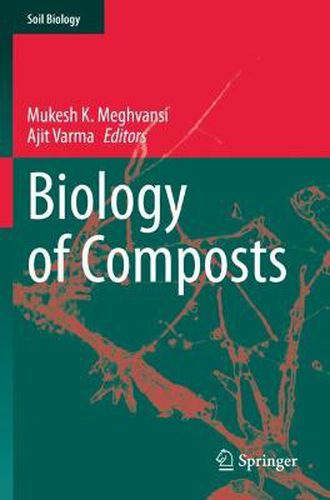Readings Newsletter
Become a Readings Member to make your shopping experience even easier.
Sign in or sign up for free!
You’re not far away from qualifying for FREE standard shipping within Australia
You’ve qualified for FREE standard shipping within Australia
The cart is loading…






This title is printed to order. This book may have been self-published. If so, we cannot guarantee the quality of the content. In the main most books will have gone through the editing process however some may not. We therefore suggest that you be aware of this before ordering this book. If in doubt check either the author or publisher’s details as we are unable to accept any returns unless they are faulty. Please contact us if you have any questions.
This book highlights the latest findings on fundamental aspects of composting, the interaction of various microorganisms, and the underlying mechanisms. In addition to addressing modern tools and techniques used for composting research, it provides an overview of potential composting applications in both agriculture and environmental reclamation.
Composting is the process of organic waste decomposition, mediated by microorganisms. The end-product is called ‘compost’ and can be used as a supplement to improve soil fertility. As the municipal waste generated in most developing countries contains a substantial amount of organic matter suitable for composting, this technology offers a win-win opportunity for stakeholders in terms of disposing of organic waste and providing organic fertilizers for agriculture. In addition, using compost reduces the dependency on harmful chemical fertilizers, and represents a sustainable and environmentally friendly alternative.
$9.00 standard shipping within Australia
FREE standard shipping within Australia for orders over $100.00
Express & International shipping calculated at checkout
This title is printed to order. This book may have been self-published. If so, we cannot guarantee the quality of the content. In the main most books will have gone through the editing process however some may not. We therefore suggest that you be aware of this before ordering this book. If in doubt check either the author or publisher’s details as we are unable to accept any returns unless they are faulty. Please contact us if you have any questions.
This book highlights the latest findings on fundamental aspects of composting, the interaction of various microorganisms, and the underlying mechanisms. In addition to addressing modern tools and techniques used for composting research, it provides an overview of potential composting applications in both agriculture and environmental reclamation.
Composting is the process of organic waste decomposition, mediated by microorganisms. The end-product is called ‘compost’ and can be used as a supplement to improve soil fertility. As the municipal waste generated in most developing countries contains a substantial amount of organic matter suitable for composting, this technology offers a win-win opportunity for stakeholders in terms of disposing of organic waste and providing organic fertilizers for agriculture. In addition, using compost reduces the dependency on harmful chemical fertilizers, and represents a sustainable and environmentally friendly alternative.